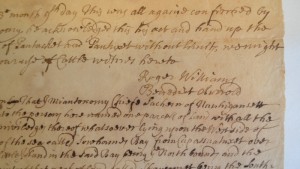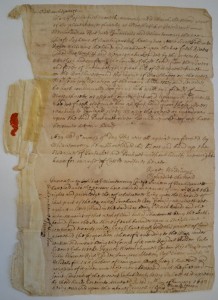This article first appeared in The Newport Daily News Guest View on February 7, 2014.
Last week the Newport Historical Society posted a picture of a manuscript in our collections on Facebook. It is a 17th century transcription of a document describing the boundaries of a 1642 purchase of land in Warwick, a mere decade after the first group of European settlers arrived. The original document was signed by Roger Williams, Benedict Arnold, and Miantonomi. The contemporaneous transcription, in our collections, was likely written by William Dyer. Do you know these names? Apparently, many of our Facebook audience members did; the post received more attention than any other in recent history.
If you are surprised that an obscure, nearly 400 year-old document — ink on paper, no more – got so much attention, you shouldn’t be. We are profoundly interested in our earliest history, and for good reason. This document represents an iconic moment in Rhode Island: Roger Williams helping to ensure that his immigrant colleagues recognize Native American sovereignty over this land, purchase what they need, and respect the boundaries of their purchase. It also represents individuals with disparate religious beliefs doing business together, and the coming together of Newport (Benedict Arnold and William Dyer) and Providence (Roger Williams) to help develop the colony.
This history is not just quaint, and not just of local interest. The earliest history of this State is in fact the earliest history of the American way. The contact of cultures that this particular paper represents is part of the actual lived experience of the American experiment in tolerance of religious difference, and the possibilities for innovation in ideas and commerce that such contact provides. Of course, this lively experiment has walked a rocky road – a generation later the Native population and the colonists were at war, and we have been imperfect practitioners of tolerance ever since. But, this was a moment, and it seems important to us, even now. And the questions of why this moment may have been fragile, and indeed why coexistence and cultural interrelations are rarely easy in spite of the advantages, deserves continued exploration.
Our State-wide history is important – not just for local pride, though that is valuable, and not just as a tourist attraction, though it certainly is that. I believe that our history represents a large data base of information about moments like the one documented here: how people thought, negotiated relationships, and found a way to make a living in a radically changed and changing world. One filled with people very different from themselves. It seems almost painfully obvious that this information may be useful to us as we think about these very issues today. Of course, the past is in fact past, and the problems we face today are both the same and different. But I think we ignore the data that our history represents at our peril. And the attention that this document got from the public suggests that many may agree.
The Newport Historical Society, along with the Rhode Island Historical Society, the State Archives, and many other historical organizations within the State hold this early history (and much more) in our collections. All of us are eager to make it possible for these collections to inform, inspire, and educate in many arenas today. One recent effort can be seen at the Statehouse Charter Museum, and in the continuing effort to rehouse and re-interpret the 1663 Charter. But we are also beginning to act in less traditional settings. Historical societies were involved in Make it Happen RI, a planning process set up by the Rhode Island Foundation and the Commerce Corp this year. The project was designed to inform the State’s strategic planning process by bringing together folks from all areas of RI’s economic activity.
We look forward to more opportunities to reach out in new ways, beyond our traditional museum audiences, because we think our history enriches many kinds of conversations. And I challenge all of you to think about the ways that Rhode Island’s history continues to have the power to inspire and enrich our lives, and our sense of who we are and what we can accomplish.
You can view a summary of the Make It Happen RI results on the Rhode Island Foundation’s website, by clicking here. You can also follow the Newport Historical Society’s efforts to study and talk about the history of religious tolerance at SpectacleofToleration.org.

